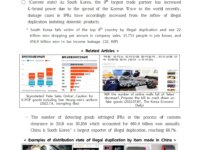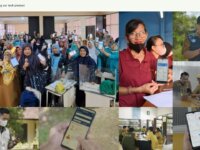The project is subject to uncovering illegal duplication in advance from overseas inflow through the AI Reading System in the process of customs clearance cooperated with Korea Customs Service. No. of uncovering illegal duplication per annum exceeds 400,000 cases and the demand for AI system is high due to lacking manpower for customs inspection and the explosive increase in importing goods. This AI system has been developed from 2020, and proving its performance in two customs office in Korea.
Innovation Tag: Cross-Sector Partnerships
In response to the Australian Government’s National Blockchain Roadmap the Blockchain Excise Platform digitises and tracks a taxable commodity (in this case pure litres of alcohol). It connects producers and regulator with real-time access to new data, generating productivity benefits and reducing illicit activity. A first of its kind blockchain ecosystem connecting the regulator to industry to more effectively control the movement, transfer and payment of liabilities for an excise commodity.
GovTech Edu works with the Indonesia MoECRT to build a technology ecosystem to create an irreversible transformation for Indonesia’s education system. It includes tech platforms made available for teachers, school principals, university students & practitioners, through products like Teacher SuperApp, Education Scorecard & University Internship Matchmaking Platform. With these, the transformation to improve student learning outcomes becomes more inclusive, data driven & impact-enabling at…
The Ukraine war established a commitment to work across sectors to improve digital services to refugees. Focus on end user needs and an unbureaucratic organizational model have produced tangible results such as:
Better update of address information in national register
Electronic identification - access to digital services
Twelve agencies worked with obstacles and bottlenecks in the refugee's user journey, with the objective of good transitions between services.
Mapo-gu created a “SOS One-Stop System” for safe bicycle path. Since there are few buildings or facilities on the bicycle path, it is difficult for users to determine their current location. The basic number plate which is installed on the bicycle path shows the path name and location number and also includes a QR image associated with the system. Through the system, people can quickly call for help in the event of an accident.
Most Brazilian metropolises have a transport network operated by a private company which makes it difficult for transport authorities to have a bright view of the public transport functioning. TRANCITY is a public transport monitoring dashboard which integrates different sources of data, such as bus location, ticketing and cameras, providing real time and historical information that supports management, planning and the operation of public transport networks, with data driven evidence.
Case Study
Safeguarding through the Moderator Proposition – The early identification of children at risk
Safeguarding children at risk of abuse requires effective multiagency working throughout safeguarding agencies. Current arrangements have proved inadequate and have failed to deliver on the imperative for integrated working. The Moderator Proposition fully resolves these outstanding operational needs. Moderator employs AI technology, with an integrated organisational 'construct', to assemble a comprehensive 'picture of events' for conjoined working across agencies. It is an holistic innovation.
Officina is a lab for innovation in the public sector whose main objective is to catalyse the energy of young talents by offering them a transformative training programme. Officina was developed to address a triple urgency: future decision makers not perceiving the public sector as an attractive workplace; the public sector having high average age workforce and lack of innovative approaches; society at large needing a more modern and appealing public sector in this key historical moment.
The Transparency+ Portal is a digital platform of the Portuguese state, where citizens can access easy-to-read and updated information on public spending in an accessible way, combining data science and storytelling. Launched in 2021, the platform is now a reference resource for monitoring European funds, State and local budgets, and public contracts. In a world often perceived through lens of mis/disinformation, Transparency+ is building trust by nurturing civic engagement and open government.
Case Study
‘Con Vos’ Network: Digitalization for Effective Governance. Community Markets to Improve Access…

When applying for state aid or other services without the means or knowledge to do it online due to the digital gap, it usually takes a day or waiting in queues and filling out paperwork. Communities have thought and offered a grassroot solution: store owners helping their peers to get online procedures done in their business, in exchange for a small fee. It is a simple innovation, yet effective when it comes to decentralize public services, foster digital inclusion, and strengthen local markets



